One evening this August, Peter Portuondo was stabbed in the arm when he attempted to block a man who was not welcome at the Strathcona Park tent city in Vancouver’s east side.
“There’s been endless little campfires in the tents and endless fights and pepper spray every day,” Portuondo said. “It’s too many gangs and too close for all the… street people to gather to be calm.”
Claudette Abraham described the tent city a different way — as a refuge after being evicted from supportive housing run by a non-profit housing provider.
“There’s over 100 of us that know each other and help each other, like if somebody’s in trouble, if someone needs extra blankets,” she said. “I do some cooking at the camp and everyone looks forward to my bannock.”
Dubbed “Camp Kennedy Trudeau,” after Vancouver’s mayor and the prime minister, the tent city at Strathcona Park, about two kilometres from the Downtown Eastside, has now been in place for four months and is home to 200 people, according to the City of Vancouver.
Supporters say the camp is needed to provide a safe place for homeless people who would be in more danger living on their own.
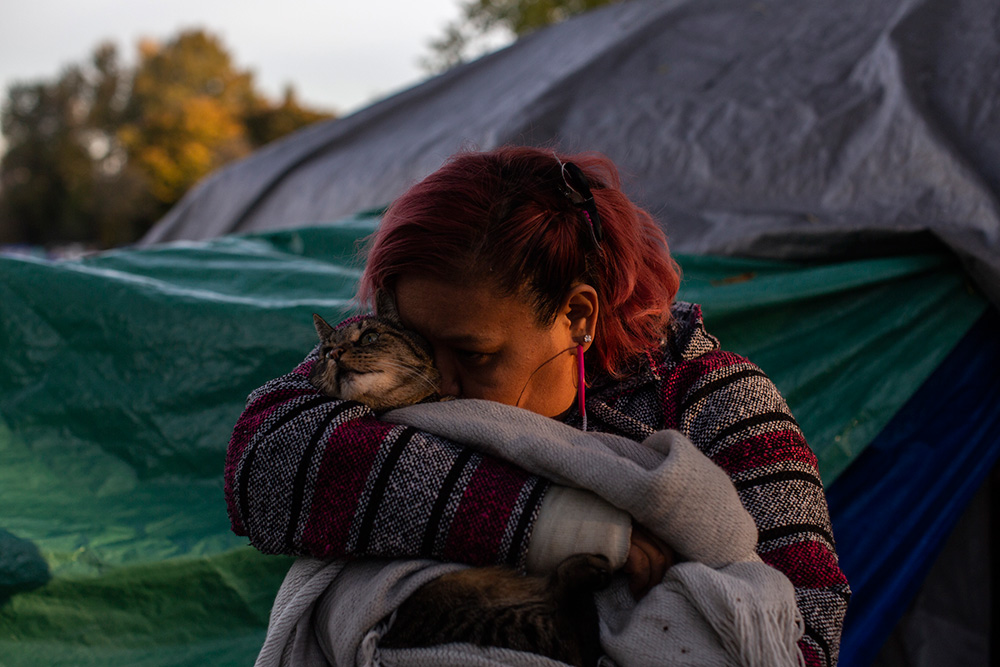
But critics say the camp has become too large, and organizers are failing to keep residents safe. In addition to the ongoing violence, the camp will have to continue to deal with the overdose crisis and COVID-19 as winter arrives.
While the city has earmarked $30 million to buy or lease hotels and single-room occupancies to house people who are homeless, and the federal government has promised another $51 million, it could take months for those options to be in place.
Meanwhile, there is no immediate plan to create smaller alternative tent city sites with more services, or to try other options like creating a tiny home village.
The main spokespeople for the camp are Chrissy Brett and Fiona York, who also provided support to a previous camp at Oppenheimer Park that lasted for two years.
They’re joined by nearly 200 volunteers who help with everything from sourcing food and water, to doing laundry, to being present at the camp’s central hub where a symbolic sacred fire burns.
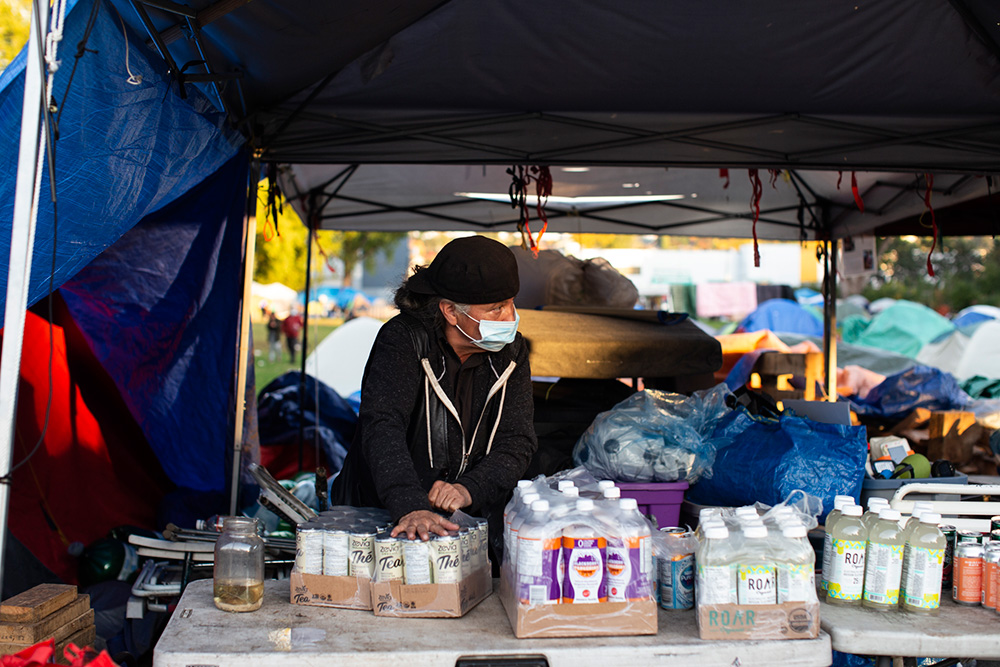
Through GoFundMe fundraisers, organizers have raised nearly $40,000 for medical supplies, to do residents’ laundry and to purchase a shower trailer.
As COVID-19 led to visitor restrictions at SROs and the closure of some drop-in spaces, homelessness rose across the city. Brett and York say tent cities are needed for those who’d be in more danger living by themselves.
But at both the Oppenheimer and Strathcona camps, there have been disturbing crimes perpetrated against camp residents, including a killing, a horrific sexual assault, multiple stabbings and physical assaults.
On Sept. 23, Carl Sinclair was seriously assaulted and left lying on the ground in Strathcona Park for 12 hours before someone called 911. His leg has since been amputated as a result of the attack.
On Oct. 16, a man was found with serious stab wounds at Raymur Avenue and Venables Street near the park; police said they believed he had been stabbed in his tent, and it was eight hours before anyone called for help.
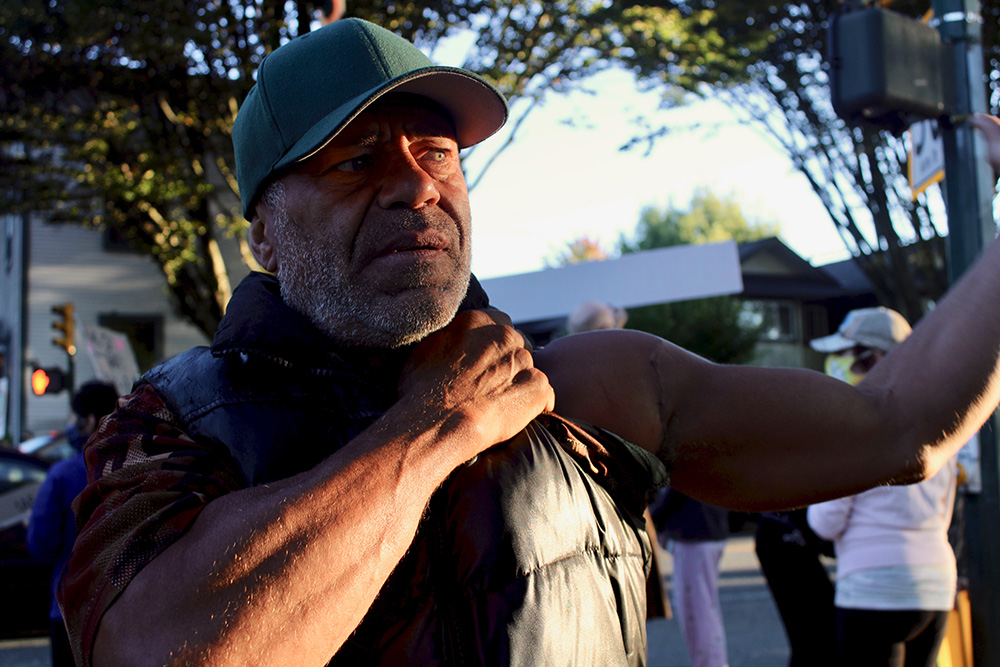
On Oct. 17, a Strathcona neighbourhood resident who has been one of the tent city’s most vocal critics was hit on the head with a pipe near her home after walking past the park. Katie Lewis, the vice-president of the Strathcona Residents’ Association, was left with a concussion and 13 stitches. She told the Vancouver Sun she believed she was targeted.
But speaking to The Tyee on Oct. 20, Lewis said she was unsure if that was the case. “I know that someone followed me home, but it could have been anyone from the neighbourhood,” she said.
Asked about the violent incidents at the park, spokesperson York said similar incidents happen in the Downtown Eastside all the time but don’t receive the same kind of scrutiny. She called on the city to provide water, showers and other amenities: right now, the park bathrooms that campers rely on are closed at dusk, and getting enough water is also a challenge.
But critics say the ongoing violence shows that things are not OK at the tent city.
“Some of these sorts of things can happen on the street from time to time, but they’re not concentrated like this,” said Karen Ward, a Downtown Eastside resident and community advocate who has been involved in setting up several previous tent cities. Ward also works with the City of Vancouver as a drug policy advisor.
“Somebody’s got eyes all the time,” Ward said, describing how violent incidents are tracked in the Downtown Eastside. “If it’s like, ‘Oh, no one saw that happen,’ then either no one’s taking any responsibility at all, or they want you to be hurt.”
Camp leaders say they have a good relationship with members of the Strathcona Residents’ Association when they meet with them. But publicly, that relationship has soured.
Speaking to city council on Oct. 8, Lewis said she was skeptical about several GoFundMe campaigns camp organizers have set up to pay for laundry, a shower trailer and medical supplies. Lewis accused camp organizers of profiting from poverty.
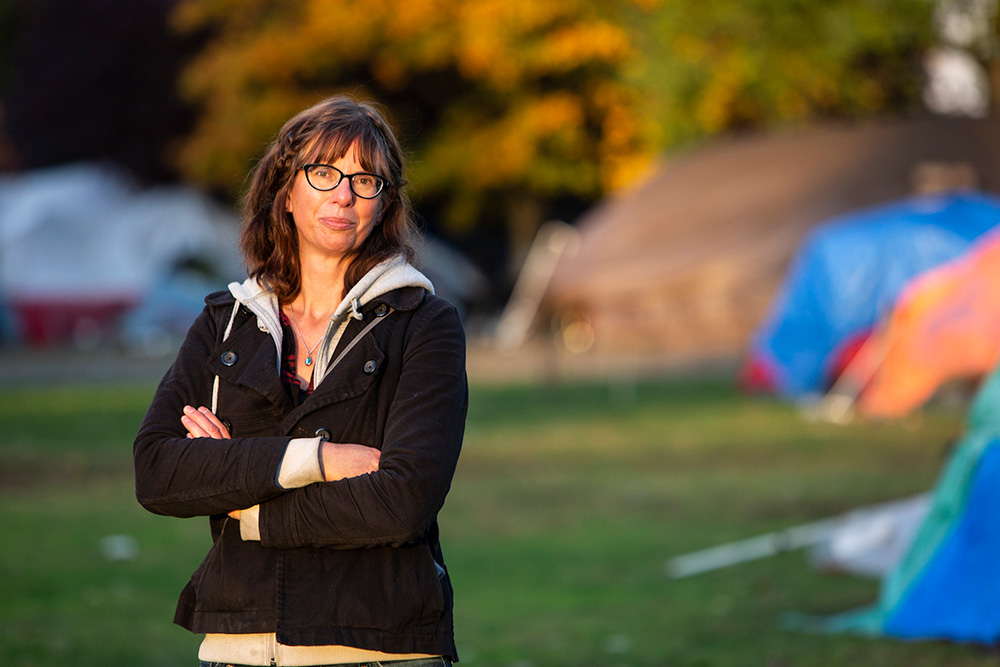
“Where is this money going? I have a guess, and let me tell you there is no shower trailer sitting there,” Lewis said. “There is no laundry.”
York said camp organizers are raising money for a shower trailer that costs $25,000. The trailer is not at the site yet because they haven’t raised all the money required to buy it, York said. (A GoFundMe for the shower trailer had raised $17,363 by this week.)
The fund for laundry, which has raised $10,770 so far, is so that volunteers can collect and wash laundry from tent city residents every week. Another $11,990 has been raised for a “health and wellness” fund, exceeding its $5,000 goal, according to GoFundMe page.
York said the money raised for the health and wellness fund has been spent equipping a medic tent with harm reduction supplies and basic first aid items like Band-Aids, gauze and disinfectant.
Another GoFundMe fundraiser begun in March raised $35,000 to help the Downtown Eastside respond to COVID-19. York said around half of that funding has gone to a food security and community kitchen program in the Downtown Eastside and has also funded the distribution of hygiene and sanitation supplies.
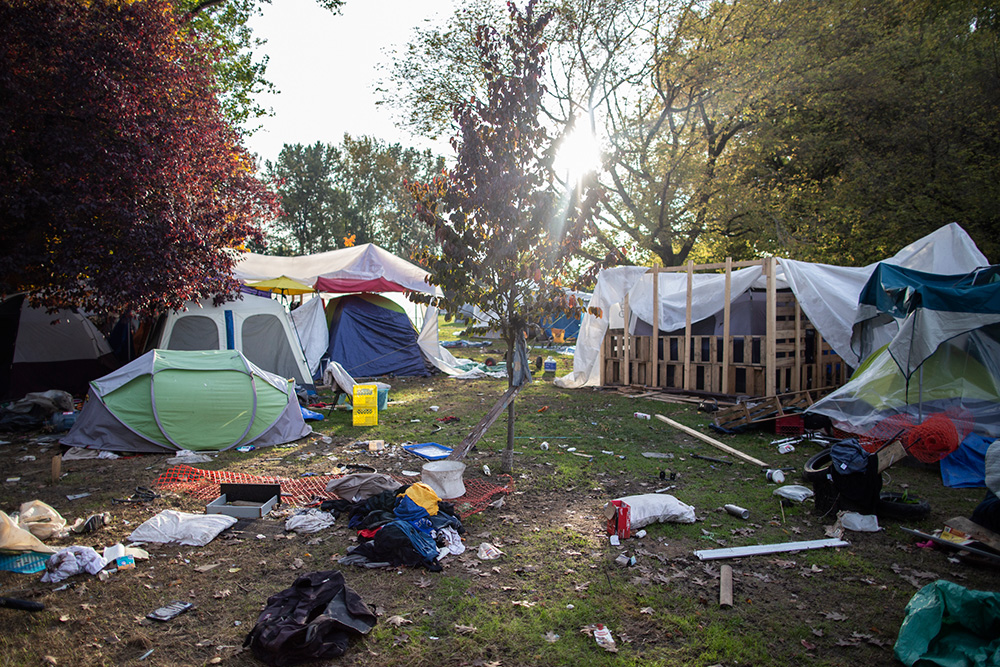
York said camp organizers are accountable to donors and have been tracking donations through a spreadsheet. But Ward said that’s not good enough.
“There’s no accountability. Are they a non-profit? Do they submit annual financial reports, anything like that?” Ward asked.
Nicole Luongo is one of the volunteers who support the camp, doing jobs like patrolling for overdoses. Luongo has experienced both homelessness and addiction in the Downtown Eastside and said the violence that happens at the camp is no worse than what happens regularly in that neighbourhood.
The only real long-term solutions for the violence are reducing poverty and legalizing drugs, Luongo said.
“Living in poverty isn’t safe, right? So for the average person, no, it’s not safe. And for someone who is acutely traumatized, which many of the residents are, it’s also not safe, but it’s probably more safe than trying to survive alone,” Luongo said.
The city prefers the option of offering supportive housing units to camp residents. But many tent city residents haven’t had good experiences living at supportive housing buildings run by non-profit providers, Luongo said, and have found a stronger sense of community and control over their own lives at the tent city.
Luongo said some residents would be open to moving to another site, such as Crab Park on the waterfront near Gastown. But an alternate site would have to be run by residents, not the city or a housing provider, she said.
“I know the idea of a sanctioned encampment had been tossed around, and I think the problem with that is going to be the same problem we see in supported housing, where folks who have built alliances — whether that be through a gang or just their own day-to-day life — are separated,” Luongo said.
“And there’s very little thought that’s gone into who would live best with whom.”
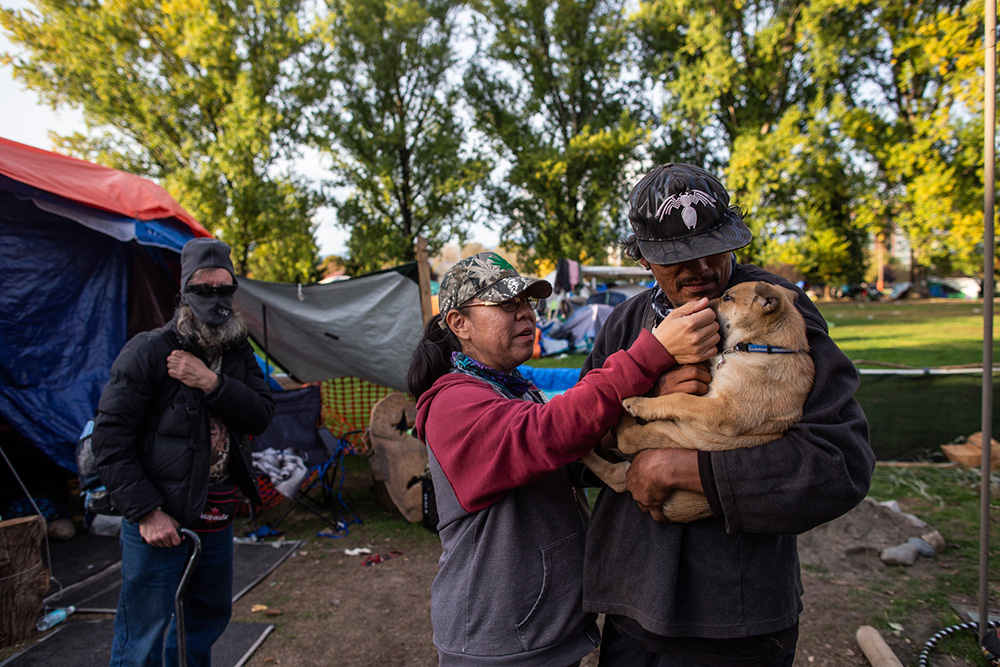
But Portuondo said the existing camp rules aren’t preventing violent attacks.
“This thing is secured by citizens, and if they say, ‘Hey you can’t come back in,’ the guy’s like ‘Yeah, I’m gonna fucking kill you tonight, I’m going to fucking knock you out,’” he said.
“There’s no cops protecting, there’s no government that says, ‘Yeah we’re going to regulate who comes in and out of here at least so the citizens trying to help don’t get threatened.’ They get threatened all the time.”
Ward was involved in organizing a tent city in a vacant lot at 58 W. Hastings St. in 2016 that lasted around six months. She said there weren’t the same problems with violence because the site was smaller and because it was fenced with just one access point, meaning organizers could control who could come in.
Organizers also covered the fence with tarps, so no one could take photos of people who live on the street and have little privacy, Ward said.
Meanwhile, tent cities located on large open sites at Oppenheimer Park and Strathcona Park have no way to control the number of people living there or who goes in or out.
Ward said she’s frustrated by what appeared to be an inability of both the camp leadership and the city to plan for the future.
“What are your solutions?” Ward demanded. “The solution appears to be, live indefinitely in the park.” ![]()
Read more: Rights + Justice, Housing




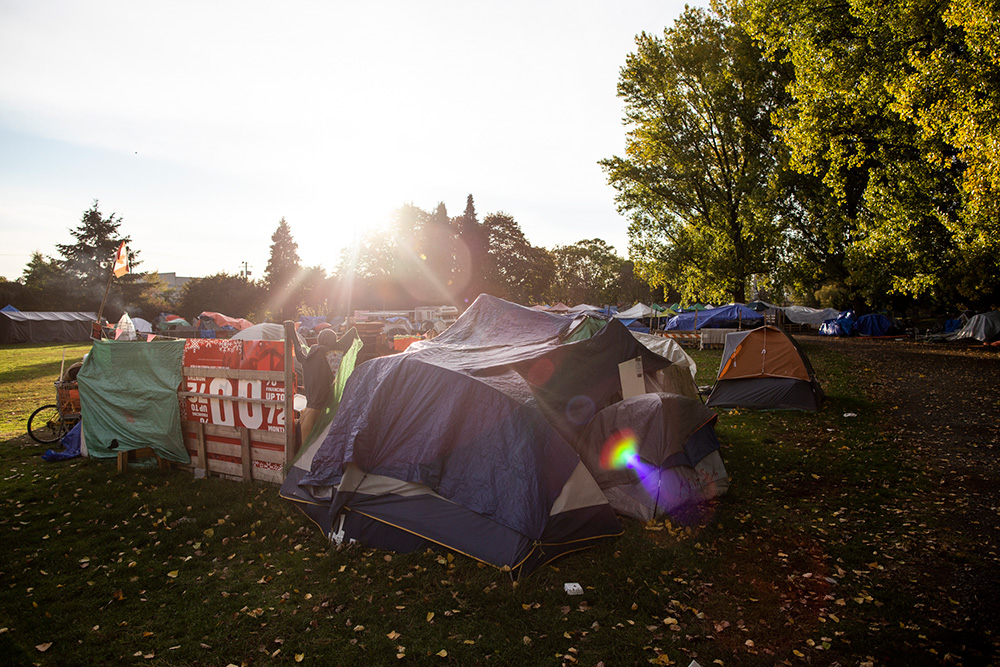












Tyee Commenting Guidelines
Comments that violate guidelines risk being deleted, and violations may result in a temporary or permanent user ban. Maintain the spirit of good conversation to stay in the discussion.
*Please note The Tyee is not a forum for spreading misinformation about COVID-19, denying its existence or minimizing its risk to public health.
Do:
Do not: